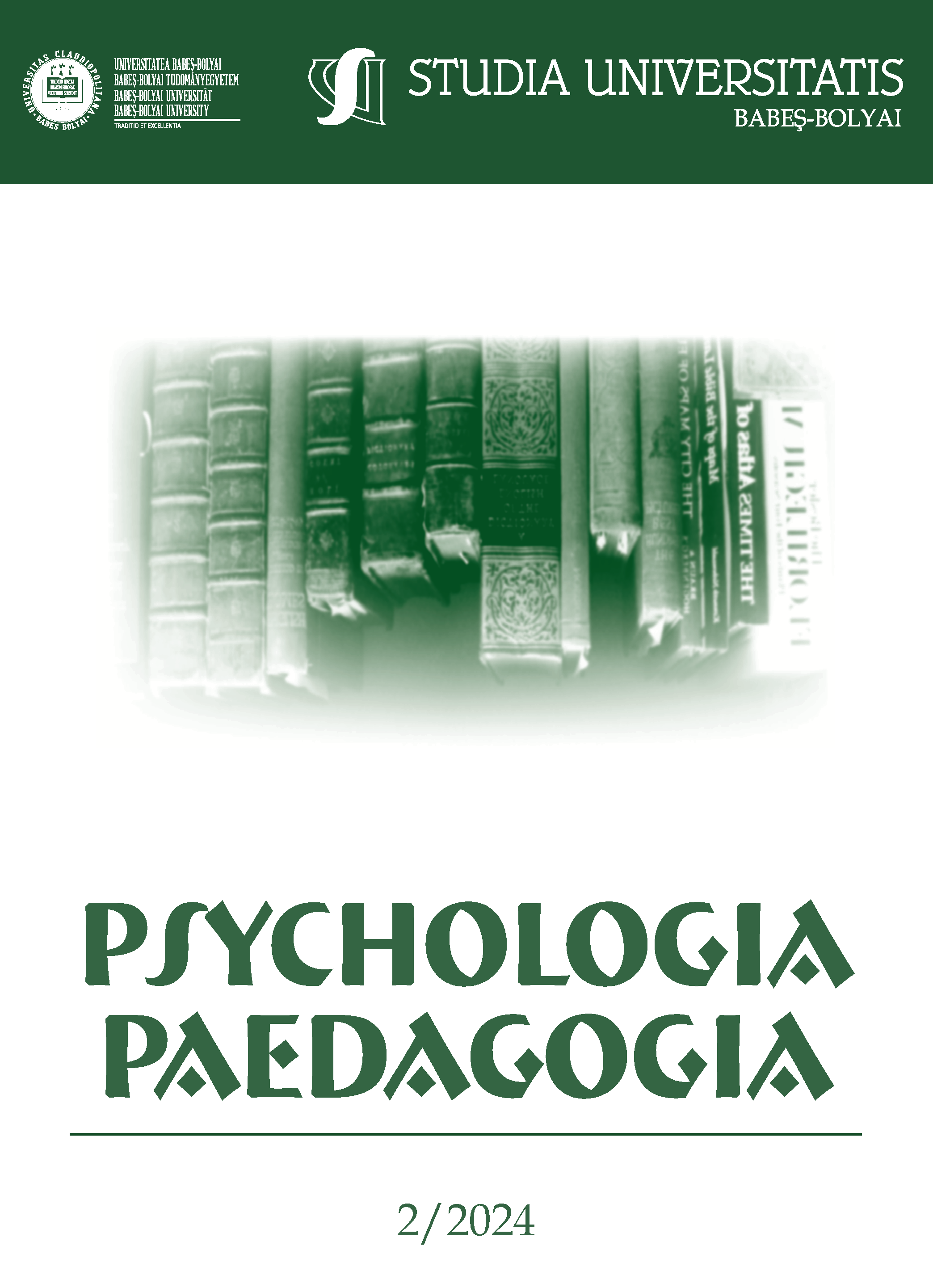The pedagogical model for developing research/investigation competence in primary school students (Natural Sciences)
DOI:
https://doi.org/10.24193/subbpsyped.2024.2.06Keywords:
school competence, research/investigation competence, didactic principle, educational paradigms, STE(A)M activitiesAbstract
The article presents the theoretical foundation of the pedagogical model for developing research/investigation competence in primary school students (Natural Sciences) - DCCI-ECP (NS). This model is based on instructional theories, learning theories, educational paradigms focused on competence, socio-constructivist and cognitive approaches, as well as didactic principles. Its structure follows the logical and scientific argumentation of the components of the educational process involved in the development of research/investigation competence (RIC). The normative framework provided by educational policy documents integrates the epistemology and teleology of RIC. The originality of the model lies in its integrated approach through STEAM project-based activities in the Natural Sciences subject for primary school students, addressing all structural components of RIC: cognitive, conative, behavioral, objective/reflexive components. The article highlights the relevance of RIC for the development of young students as a general school competence within the Romanian educational system.
References
Australian Curriculum, Assessment and Reporting Authority. (n.d.). Cross-Curriculum Priorities (Version 8.4). Available: https://www.australiancurriculum.edu.au/
Botgros, I., Franțuzan, L., & Simion, C. (2015). Scientific Knowledge Competence – Optimization System: Methodological Guide. Chișinău: IȘE.
Chiriac, T. (2022). Principles and pedagogical aspects of STEM education. In Inter/transdisciplinary approaches in teaching real sciences (STEAM concept) (pp. 245-255). 2nd ed. Chișinău: Tipografia UST. Available: https://ibn.idsi.md/sites/default/files/imag_file/245-255_2.pdf.
Ciascai, L., & Dulama, E. (2013). What Specific Science Abilities and Skills Are Romanian Students Developing During Primary Education? A Comparison with the Abilities Tested by the TIMSS 2011 Inquiry. Acta Didactica Napocensia, 6, 29-44.
Cristea, S. (2003). Fundamentals of Educational Sciences. General Theory of Education. Chișinău: Litera Educațional.
Franțuzan, L. (2009). Formation of scientific knowledge competence in high school students in an inter/transdisciplinary context (PhD Thesis). Chișinău: Manuscript.
Gînju, T. (2021). General Didactics. Course Notes. Bălți: Tipografia „Indigou Color”. ISBN 978-9975-3490-2-4.
Guidelines for Designing, Updating, and Evaluating the National Curriculum. (2019). Educational Policy Document. 69 p. Available: https://www.edu.ro/sites/default/files/DPC_31.10.19_consultare.pdf (Accessed 18.12.2023).
Guțu, V. (2018). Competence - Situational, Structural, and Methodological Approach. Studia Universitatis Moldaviae. Education Sciences Series, 5(115), 3-12. ISSN 1857-2103. https://ibn.idsi.md/vizualizare_articol/66573 (Accessed 11.01.2024).
Guțu, V., Bucun, N., Ghicov, A., et al. (2017). Reference Framework of the National Curriculum. Chișinău: Lyceum. ISBN 978-9975-3157-7-7.
Ionescu, M., & Radu, I. (1995). Modern Didactics. Cluj-Napoca: Ardealul Printing House.Ivan, A.-O. (2016). Teaching and Learning Through Research as a Strategy in an Integrated Curriculum. Explorations in Primary Education. PhD Thesis, University of Bucharest. 450 p.
Manolescu, M. (Coord.). (2013). Interdisciplinary Organization of Learning Offers for the Formation of Key Competences in Young Schoolchildren – ICOS. Course Support. University of Bucharest - Faculty of Psychology and Educational Sciences. Department for Teacher Training and Softwin SRL. 147 p. Available: https://www.academia.edu/17541863/Suport_Curs_ICOS_2013_1_1. (Accessed 10.12.2023).
Miclea, M. (2002). Cognitive Psychology. Theoretical and Experimental Models. 2nd Edition, Revised, Iași: Editura Polirom. ISBN: 973-683-248-1.
Ministry of National Education. (2013). Order No. 3371/2013 Regarding the Approval of Framework Plans for Primary Education and the Methodology for Applying the Framework Plans for Primary Education. Official Gazette, Part I No. 192 of April 5, 2013. Annex 1. Available at https://lege5.ro/Gratuit/gm2dqobsgy/planul-cadru-de-invatamant-pentru-invatamantul-primar-ordin-3371-2013?dp=gy2dcnzwha4ts (Accessed 13.12.2023).
Ministry of National Education. (2014). Curriculum for the natural sciences subject: Grades III-IV. Bucharest: Ministry of National Education. Available: www.edums.ro/invprimar/STIINTE%20ALE%20NATURII%20III%20IV%202014.pdf (Accessed 13.12.2023).
Ministry of Education, Culture and Research of the Republic of Moldova. (2014). Education Code of the Republic of Moldova: no. 152 of 17.07.2014. In: Official Gazette of the Republic of Moldova, 2014, no. 319-324.
Ministry of National Education and Culture of Finland. (2014). National Core Curriculum for Basic Education. Finnish National Agency for Education. Available: https://www.researchgate.net/publication/339573422_Curriculum_in_Primary_Education_Finland
Ministry of Education, Culture, and Research of the Republic of Moldova. (2018). National Curriculum. Primary Education. Chișinău: Ministry of Education, Culture, and Research. 212 p.
Ministry of Education, Culture and Research of the Republic of Moldova. (2019). Curriculum Implementation Guide for Science, Grade 5. Chisinau: Ministry of Education, Culture and Research.
Neacșu, I. (2015). Effective Learning Methods and Techniques. Foundations and Successful Practices. Iași: Editura Polirom.
OECD. (2022). PISA 2022 Results. Available: https://www.oecd.org/publication/pisa-2022-results/country-notes/romania-cfe329e8/ (Accessed 13.02.2023).
Pahome, D. (2023). Formation of Representations in Primary Education, in Sciences. Cluj-Napoca: Presa Universitară Clujeană. ISBN: 978-606-37-1980-6.
Parliament of Romania. (2023). Pre-university Education Law No. 198/2023: Official Gazette, Part I No. 613 of July 5, 2023. Available: https://lege5.ro/Gratuit/geztqmjtgq2tm/legea-invatamantului-preuniversitar-nr-198-2023 (Accessed 13.12.2023).
Prahova County School Inspectorate. (2024). Methodical letter: Guidelines for the conduct of activities in the 2024-2025 school year, primary education. Approved by the General School Inspector, Prof. Ilona Rizea. Prahova.
Sclifos, L. (2007). Psychopedagogical Guidelines for the Formation of Investigative Competence in High School Students. PhD Thesis in Pedagogy, Chișinău: Manuscript.
Teleman, A. (2010). Formation of Exploration/Investigation Competence of Ecological Processes in Primary School Students. PhD Thesis in Pedagogy, Chișinău: Manuscript.
Ursu, L., & Cutasevici, A. (2019). Transdisciplinarity in the Context of the Curriculum for Primary Education. In Didactica Pro..., Journal of Educational Theory and Practice, 1(113), 5-11.
Downloads
Published
How to Cite
Issue
Section
License
Copyright (c) 2024 Studia Universitatis Babeș-Bolyai Psychologia-Paedagogia

This work is licensed under a Creative Commons Attribution-NonCommercial-NoDerivatives 4.0 International License.


